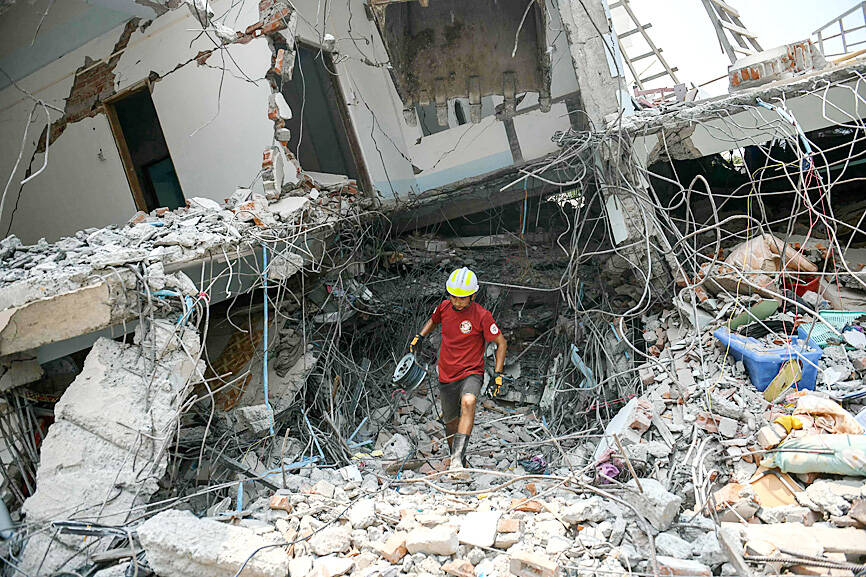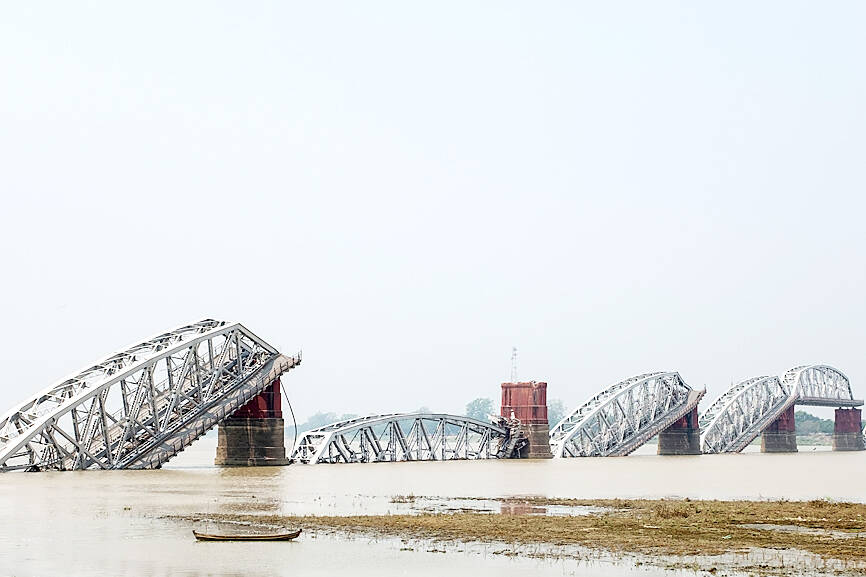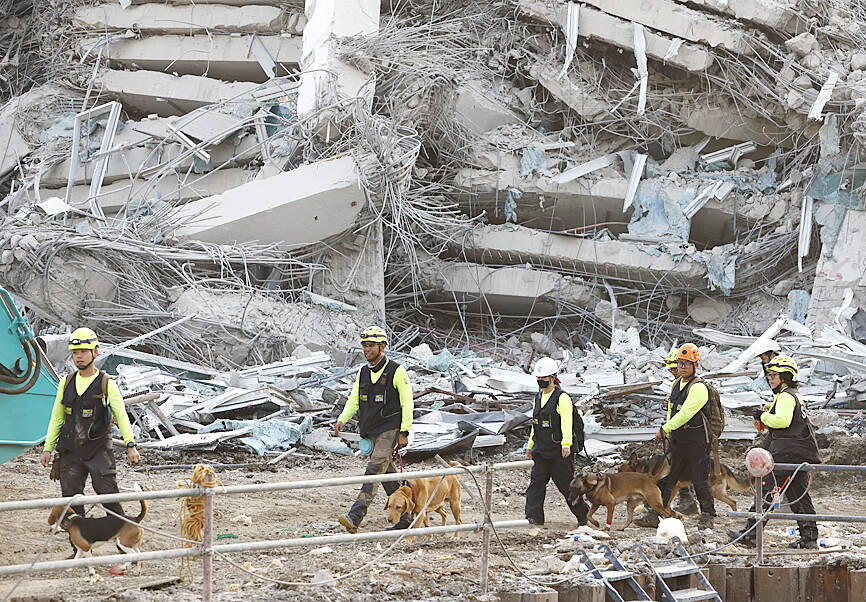The death toll from a huge earthquake that hit Myanmar and Thailand passed 1,000 yesterday, as rescuers dug through the rubble of collapsed buildings in a desperate search for survivors.
The shallow magnitude 7.7 quake struck northwest of the city of Sagaing in central Myanmar in the early afternoon, followed minutes later by a magnitude 6.7 aftershock.
The quake destroyed buildings, downed bridges and buckled roads across swathes of Myanmar, with massive destruction in Mandalay, the country’s second-biggest city and home to more than 1.7 million people.

Photo: AFP
“We need aid,” said Thar Aye, 68, a resident of Mandalay. “We don’t have enough of anything.”
At least 1,007 people were killed and about 2,400 were injured in Myanmar, with 30 more missing, the junta said in a statement.
About 10 more deaths had been confirmed in Bangkok.

Photo: EPA-EFE/STRINGER
However, with communications badly disrupted, the true scale of the disaster is only starting to emerge from the isolated military-ruled state, and the toll is expected to rise significantly.
More than 90 people could be trapped in the crushed remains of one apartment block in Mandalay, a Red Cross official said.
This was the biggest quake to hit Myanmar in decades, according to geologists, and the tremors were powerful enough to severely damage buildings across Bangkok, hundreds of kilometers away from the epicenter.

Photo: EPA-EFE
In Mandalay, Agence France-Presse journalists saw a centuries-old Buddhist pagoda that had been reduced to rubble.
“It started shaking, then it started getting serious,” a soldier at a checkpoint on the road outside the pagoda said. “The monastery also collapsed. One monk died, some people were injured, we pulled out some people and took them to the hospital.”
Guards at Mandalay Airport turned away journalists.
Damage to the airport would complicate relief efforts in a country whose rescue services and healthcare system have already been ravaged by four years of civil war sparked by a military coup in 2021.
Junta chief Min Aung Hlaing on Friday issued an exceptionally rare appeal for international aid, indicating the severity of the calamity.
Previous military governments have shunned foreign assistance, even after major natural disasters.
The country declared a state of emergency across the six worst-affected regions after the quake, and at one major hospital in the capital, Naypyidaw, medics were forced to treat the wounded in the open air.
Offers of foreign assistance began coming in, with US President Donald Trump on Friday pledging US help.
An initial flight from India carrying hygiene kits, blankets, food and other essentials landed in the commercial capital Yangon yesterday.
China said it sent an 82-person team of rescuers to Myanmar.
Aid agencies have warned that Myanmar is unprepared to deal with a disaster of this magnitude.
About 3.5 million people were displaced by the raging civil war, many at risk of hunger, even before the quake struck.
Across the border in Bangkok, rescuers worked through the night searching for survivors trapped when a 30-story skyscraper under construction collapsed, reduced in seconds to a pile of rubble and twisted metal by the force of the shaking.
Bangkok Governor Chadchart Sittipunt said that about 10 people had been confirmed killed across the city, most in the skyscraper collapse.

Right-wing political scientist Laura Fernandez on Sunday won Costa Rica’s presidential election by a landslide, after promising to crack down on rising violence linked to the cocaine trade. Fernandez’s nearest rival, economist Alvaro Ramos, conceded defeat as results showed the ruling party far exceeding the threshold of 40 percent needed to avoid a runoff. With 94 percent of polling stations counted, the political heir of outgoing Costa Rican President Rodrigo Chaves had captured 48.3 percent of the vote compared with Ramos’ 33.4 percent, the Supreme Electoral Tribunal said. As soon as the first results were announced, members of Fernandez’s Sovereign People’s Party

MORE RESPONSIBILITY: Draftees would be expected to fight alongside professional soldiers, likely requiring the transformation of some training brigades into combat units The armed forces are to start incorporating new conscripts into combined arms brigades this year to enhance combat readiness, the Executive Yuan’s latest policy report said. The new policy would affect Taiwanese men entering the military for their compulsory service, which was extended to one year under reforms by then-president Tsai Ing-wen (蔡英文) in 2022. The conscripts would be trained to operate machine guns, uncrewed aerial vehicles, anti-tank guided missile launchers and Stinger air defense systems, the report said, adding that the basic training would be lengthened to eight weeks. After basic training, conscripts would be sorted into infantry battalions that would take

GROWING AMBITIONS: The scale and tempo of the operations show that the Strait has become the core theater for China to expand its security interests, the report said Chinese military aircraft incursions around Taiwan have surged nearly 15-fold over the past five years, according to a report released yesterday by the Democratic Progressive Party’s (DPP) Department of China Affairs. Sorties in the Taiwan Strait were previously irregular, totaling 380 in 2020, but have since evolved into routine operations, the report showed. “This demonstrates that the Taiwan Strait has become both the starting point and testing ground for Beijing’s expansionist ambitions,” it said. Driven by military expansionism, China is systematically pursuing actions aimed at altering the regional “status quo,” the department said, adding that Taiwan represents the most critical link in China’s

‘REALLY PROUD’: Nvidia would not be possible without Taiwan, Huang said, adding that TSMC would be increasing its capacity by 100 percent Nvidia Corp CEO Jensen Huang (黃仁勳) on Saturday praised and lightly cajoled his major Taiwanese suppliers to produce more to help power strong demand for artificial intelligence (AI), capping a visit to the country of his birth, where he has been mobbed by adoring fans at every step. Speaking at an impromptu press conference in the rain outside a Taipei restaurant, where he had hosted suppliers for a “trillion-dollar dinner,” named after the market capitalization of those firms attending, Huang said this would be another good year for business. “TSMC needs to work very hard this year because I need a lot